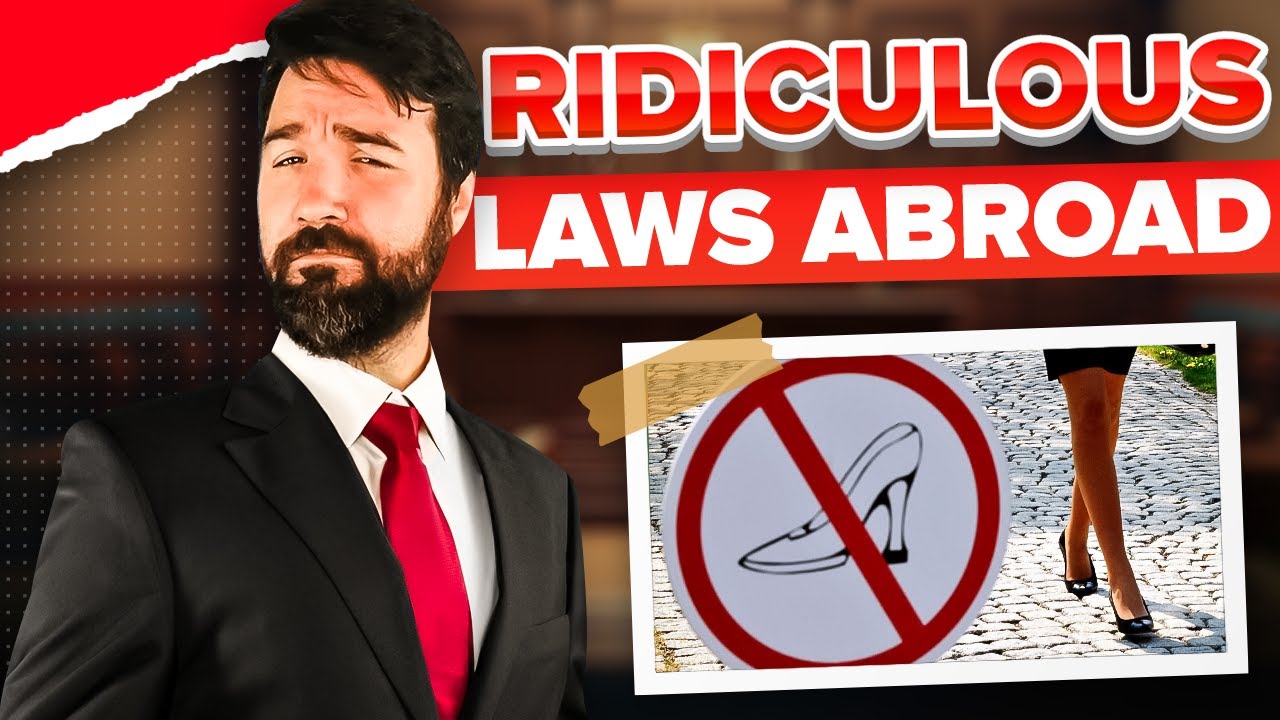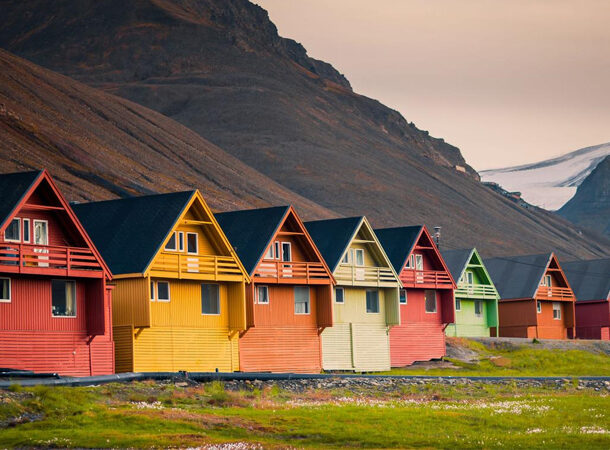Have you ever felt overregulated and underappreciated? Yes, people, we’re talking about laws. The rules and regulations that govern every single one of us – to some degree – everywhere around the world. They are designed to protect the common people and punish those who break them, ensuring that society remains stable and the world as we know it does not fall into total anarchy.
However, in between the do not murder anyone and don’t steal other people’s stuff, are laws that are simply absurd, and they exist everywhere.
And we mean it when we say everywhere.
From the United States to Swaziland, we’ve gone in search of the world’s most ridiculous laws and uncovered them all!
Today, we bring you 25 Ridiculous Laws From Around The World.

No Public Mating For Frisky Animals
 https://www.mercurynews.com/2017/08/02/no-amorous-pets-within-500-feet-of-a-church-and-other-weird-laws/
https://www.mercurynews.com/2017/08/02/no-amorous-pets-within-500-feet-of-a-church-and-other-weird-laws/ That’s right; in California, animals have been prohibited from publicly mating within 1,500 feet (that’s roughly 450 meters) of any tavern, school, or church. What we’re curious about is how this regulation is enforced and why this would be an issue for any community or its local schoolchildren. I’m sure no Californian has ever been compelled to watch animals mate during church, and we couldn’t discover footage of any “guards” or “regulators” in charge of keeping said frisky animal couples from getting it on within 1,500 feet of a school. This law is entirely nonsensical and does not make sense in any way, shape, or form.
No Swearing At Sporting Events in Massachusetts
 https://malegislature.gov/Laws/GeneralLaws/PartIV/TitleI/Chapter272/Section36A#:~:text=Section%2036A.,not%20more%20than%20fifty%20dollars.
https://malegislature.gov/Laws/GeneralLaws/PartIV/TitleI/Chapter272/Section36A#:~:text=Section%2036A.,not%20more%20than%20fifty%20dollars. Laws against swearing, broader in scope than blasphemy, have existed since the United States’ early beginnings. Yes, sir, those pilgrims had their feet planted firmly in keeping things wholesome. Today, the federal government remains committed to its First Amendment stance, while local government rules vary considerably. They can include everything from complete speech protection to narrow, often bizarre laws that regulate certain words or phrases.
One of our favorites for today’s list, primarily for its futility (for obvious reasons), is the Massachusetts ban on swearing at a sporting event. Really. Red Sox fans are not allowed to swear at the visiting Yankees. And, because the regulation is statewide and applies to all sporting events, informing your little cousin that they kicked a— in their baseball game is forbidden and punishable by a $50 fine.
No Hiking in Flip-Flops
 https://www.news.com.au/travel/destinations/europe/italian-region-is-fining-tourists-4000-for-wearing-thongs/news-story/6f9f72d5bae523c21f7aa3ca28c1a805
https://www.news.com.au/travel/destinations/europe/italian-region-is-fining-tourists-4000-for-wearing-thongs/news-story/6f9f72d5bae523c21f7aa3ca28c1a805 Are you planning a holiday to Cinque Terre (pronunciation – singk teuh), the Italian beach resort, next summer? Remember to pack your hiking boots. Local rescue squads have grown increasingly fed up with saving unprepared tourists. Many visitors take a stroll between the seashore towns, not realizing that the pathways between the villages are rugged mountain treks. Plenty of visitors have had to be rescued after being stranded on the rocky goat tracks while wearing flimsy summer footwear.
In an effort to instill a bit of common sense, the local National Park administration began charging serious fines to anyone spotted on the trails without adequate footwear. That’s correct; wearing “flip-flops” in some regions of the popular coastal town will result in a $4,000 “education” fee.
Don’t Get Drunk in a Bar
 https://www.alcoholproblemsandsolutions.org/alaska-alcohol-laws-laws-surprise/
https://www.alcoholproblemsandsolutions.org/alaska-alcohol-laws-laws-surprise/ A bar is one of the most likely places to get drunk. So it’s ironic that Alaska enacted legislation banning people from getting drunk in bars. The regulation was enacted after the state government discovered that drunks caused the vast majority of crimes in Alaska…
Who would have thought?
Alaskan cops started implementing the law in 2012. Plainclothes officers went to various establishments looking for inebriated customers. They contacted other officers to conduct the arrest when they believed someone was drunk. Bartenders were not spared, as they could be prosecuted for supplying alcohol to intoxicated customers. Because there was no way to prove that a person was, in fact, drunk, cops only arrested those who were throwing up, falling off stools, or being a nuisance.
An Illegal Ketchup Situation
 https://www.mashed.com/819639/heres-why-kids-in-france-cant-have-ketchup-at-school/
https://www.mashed.com/819639/heres-why-kids-in-france-cant-have-ketchup-at-school/ We’re not sure how we feel about the following bit of legislation. But it probably sucks to be French. In 2011, French students were bitterly disappointed when they discovered that a law had been enacted that specified that sauces (such as ketchup, mayonnaise, and the like) could only be served with specific dishes. It would not be available freely anymore. So, while the kids could have ketchup with their french fries – it wouldn’t be available for other dishes.
News outlets jumped on the news, and different stories were published. Some reported that ketchup had been banned in its entirety. According to some, the “saucy legislation” was intended to improve the general nutritional quality of students’ meals. However, many maintained that the French government banned ketchup in order to promote the nation’s traditional French dishes and culture.
Having a Permanent Marker on Private Property
 https://www.oklahoman.com/story/news/crime/2010/12/22/using-marker-at-school-leads-to-oklahoma-teens-arrest/61192742007/
https://www.oklahoman.com/story/news/crime/2010/12/22/using-marker-at-school-leads-to-oklahoma-teens-arrest/61192742007/ In December 2010, an unidentified 13-year-old pupil at Roosevelt Middle School, which is located in Oklahoma City, Oklahoma, was placed under citizen’s arrest by a teacher, Ms Delynn Woodside, after he wrote on a piece of paper with a permanent marker and it flowed onto his desk. Ms Woodside alleged that the unidentified boy actually used the marker to write on his desk. Does that sound crazy? Well, maybe it was. We can’t speak for Ms Woodside.
You see, the boy’s arrest had absolutely nothing to do with the fact that he scribbled on his desk with a marker. The issue was the marker. Oklahoma City Ordinance 35-202 makes it illegal to possess a permanent marker (or spray paint, for that matter) on private property unless you have permission. The rule was enacted to discourage graffiti artists from putting graffiti on private property. Still, we think it was a tad excessive to arrest a 13-year-old over it.
Visiting Your Parents
 http://www.bbc.com/news/world-asia-china-23124345
http://www.bbc.com/news/world-asia-china-23124345 This item on our list may seem insignificant to anyone under 40. But at a certain point in your life, you’re all grown up, with a family of your own and a schedule that often makes you wish you were back in school again. When you get to that point, remember that you would have had a younger mum or dad to take care of you – and that it is probably your turn to return the favor – if you are lucky enough and they are still around.
This item on our list is bizarre because a law must be made out of it. China created the Elderly Rights Law in 2013, requiring adults to visit their older parents “on a regular basis.” There is no clarity on what “often” means, but if the kids do not comply, the court may order them to visit their parents a specific amount of times each month. Just visit your parents, people – we shouldn’t need laws to tell us to do so.
When It Is Illegal To Die Within Town Limits
 https://www.iflscience.com/it-is-against-the-law-to-die-in-this-town-for-very-good-reason-46724
https://www.iflscience.com/it-is-against-the-law-to-die-in-this-town-for-very-good-reason-46724 Several towns in various countries have either permanently or temporarily prohibited citizens from dying within their town limits. The mayor of Falciano dal Massico, Italy, barred residents from dying within town limits in 2012. The mayor announced the ban after the local graveyard became full. People would only be allowed to die within town limits once a new cemetery had been established. During the time the law was in effect, at least two people died. The same thing happened in the town of Bordeaux, France. Pretty ridiculous – we know.
Longyearbyen, Norway, has had a permanent ban on death in place since 1950. The village is considered the world’s most northernmost city (with more than 1,000 residents) and is buried in permafrost. The restriction was enacted after villagers realized that the deceased merely froze in the cemetery rather than decomposing. This meant that deadly diseases could survive in the bodies and possibly re-infect the living. Old and sickly persons are frequently taken off the island to spend their last days elsewhere.
A Moose Can't Enter A Saloon Via The Sidewalk
 https://www.onlyinyourstate.com/alaska/crazy-laws-in-ak/
https://www.onlyinyourstate.com/alaska/crazy-laws-in-ak/ In Fairbanks, Alaska, it is against the law for a moose to enter a restaurant or bar through the sidewalk. The interesting piece of legislation came about early in the twentieth century because a saloon owner loved to get his pet moose drunk. The inebriated moose repeatedly went on rampages and destroyed people’s property. Officials eventually had enough and enacted a law banning moose from walking on public sidewalks, which meant that the moose in question could no longer enter the man’s saloon. That stopped the saloon owner from bringing his moose to work – but the poor animal would still be served alcohol at home. We’re not sure why they couldn’t just make it illegal to get your moose drunk – but hey, it was different times.
Don’t Swear in the Caribbean
 http://www.businessinsider.com/50-cent-was-arrested-for-swearing-at-a-caribbean-concert-2016-6?_ga=2.255139979.240051028.1517516354-1283842147.1513361809
http://www.businessinsider.com/50-cent-was-arrested-for-swearing-at-a-caribbean-concert-2016-6?_ga=2.255139979.240051028.1517516354-1283842147.1513361809 If you have a potty mouth and you know it, clap your hands – no, actually, if you have a potty mouth and you know it – do not visit the Caribbean. In fact, we straight up recommend that you keep any sailor talk in your home country!
Saint Kitts, popularly known as Saint Christopher Island, has stringent laws against using profanity in public, and failure to comply can result in arrest. That’s what happened to rapper 50 Cent in 2016 when he let a curse word slip during a concert. Take note: these cops are not to be trifled with.
You’re Not Allowed To Get Fat in Japan
 https://www.mic.com/articles/84521/japan-has-cut-obesity-to-3-5-in-a-controversial-way-that-wouldn-t-fly-in-america#.E6Z8fOqGm
https://www.mic.com/articles/84521/japan-has-cut-obesity-to-3-5-in-a-controversial-way-that-wouldn-t-fly-in-america#.E6Z8fOqGm Although Japan has no obesity problem, the government opted to take a proactive approach to the benefits of keeping a healthy weight. As a result, Japan forbade its citizens from being overweight in 2008. All citizens over 40 are required by the “metabo law” to have their waistline measurements taken every year. Anyone found to be overweight receives three months to lose the excess weight. Following that, they are subjected to mandatory nutritional “advice and guidance,” followed by six months of “reeducation” if they do not make adequate progress.
Employers are responsible for ensuring that their employees participate in the scheme or face fines of up to $19 million. So far, the Metabo scheme has reduced obesity by 3.5 percent, which is outstanding in a country with already low obesity levels.
No High Heels in Greece, Please
 https://www.npr.org/templates/story/story.php?storyId=104239042
https://www.npr.org/templates/story/story.php?storyId=104239042 The historic parts of Greece that is. High heels are not permitted at several ancient sites because they may cause damage to the site. According to NPR, food and drink were also prohibited when maintenance workers discovered over 60 pounds of gum (that’s over 27 kg!) under the seats of a theatre that was erected in 161 C.E.
The freedom to wear heels isn’t exactly terrifying, but some rights around the world are still not universal. Although this one is bizarre, it definitely makes sense.
Bathing Suits On The Beach Only
 http://www.fco.gov.uk/en/travel-and-living-abroad/travel-advice-by-country/europe/spain
http://www.fco.gov.uk/en/travel-and-living-abroad/travel-advice-by-country/europe/spain If you’ve never been to Barcelona, now might be the time to book your trip. It’s famous for its football team, architecture, lively nightlife, golden beaches, and amazing food. Not to mention a booming cultural history and bustling community festivals that draw tourists from just about every corner of the world.
However, should you ever visit the culture-rich city, remember not to leave the beach in your swimwear. Your swimming attire is not allowed on the streets of this Spanish city – no matter how cute or colorful it is. If you want to leave the beach or promenade, cover yourself, or change out of your bathing suit. Trust us on this one – forgetting to do so will result in a considerable blow to your wallet.
Don’t Insult Thailand’s Monarchy
 https://edition.cnn.com/2023/09/19/asia/thailand-king-son-lese-majeste-exhibit-intl-hnk/index.html#:~:text=Thailand%20has%20some%20of%20the,royal%20family%20fraught%20with%20risk.
https://edition.cnn.com/2023/09/19/asia/thailand-king-son-lese-majeste-exhibit-intl-hnk/index.html#:~:text=Thailand%20has%20some%20of%20the,royal%20family%20fraught%20with%20risk. Thailand’s lese majeste law prohibits anyone from slandering the Thai royal family. The law is highly controversial in Thailand, where it has been used to persecute political opponents. However, it becomes even more controversial when we consider that the king’s dog is viewed as a member of the royal family, and those who insult the dog can face legal action. In 2015, a Thai man faced up to 37 years in prison in a closed court for making humorous remarks about the king’s dog. The dog in question was a mongrel named Thong Daeng (Copper), the favorite of the late king.
Thanakorn Siripaiboon, the accused, allegedly criticized Copper, King Bhumipol, and an ongoing military corruption trial on Facebook. Nobody knows what Thanakorn said about Copper since repeating it would be perpetrating the crime again. Because of Thailand’s censorship laws, journalists could not print whatever Thanakorn allegedly shared. In fact, the international edition of The New York Times distributed in Thailand left the space where the alleged insult was meant to be printed blank.
The Licence Plate Law in The Philippines
 https://www.stupidlaws.com/based-on-the-number-of-a-cars-license-plate-cars-are-restricted-from-use-on-certain-days-of-the-week/
https://www.stupidlaws.com/based-on-the-number-of-a-cars-license-plate-cars-are-restricted-from-use-on-certain-days-of-the-week/ This law is fascinating because it is so incredibly specific. In the Philippines, cars with license plates ending in a 1 or 2 are not permitted on the highways on Monday; if it ends on 3 or 4, you can’t be on the highway on Tuesday; if it ends on 5 or 6 – the Wednesday; 7 or 8 on Thursday; and if it ends on 9 or 0 you are not allowed to be on the highway on Friday. We have yet to learn what motivated the creation of this law, let alone how it is managed and enforced. Its logic is related to some sort of identification and status mechanism, but the law is so complex and irrelevant that it was impossible to do in-depth research on it.
No Sandcastles Allowed
 https://www.forbes.com/sites/rebeccahughes/2022/08/09/no-building-sandcastles-or-stripping-off-how-to-avoid-hefty-holiday-fines-in-italy/?sh=220f004d61b2
https://www.forbes.com/sites/rebeccahughes/2022/08/09/no-building-sandcastles-or-stripping-off-how-to-avoid-hefty-holiday-fines-in-italy/?sh=220f004d61b2 There are plenty of things you are forbidden to do in Italy. For example, low-cut jeans, miniskirts, and tops showing “too much” cleavage have been banned in some towns and cities. Swearing and lying on park benches – even climbing trees- could end in a fine. In Rome, you are not allowed to eat on the street, kiss somebody inside a car, or exercise your dog on anything but a short leash.
One of the most bizarre laws in Italy, though, can be found in Eraclea, near Venice, where it is prohibited to build sandcastles on the beach. The reason? According to the Italians, they cause an obstruction. A lonely sandcastle. On an enormous beach. What can we say? Safety comes first.
Rapists can claim parental rights in Minnesota
 https://www.ssdpa.com/blog/do-rapists-have-parental-rights-in-minnesota#:~:text=But%2C%20in%20fact%2C%20fewer%20than,not%20have%20such%20a%20law.
https://www.ssdpa.com/blog/do-rapists-have-parental-rights-in-minnesota#:~:text=But%2C%20in%20fact%2C%20fewer%20than,not%20have%20such%20a%20law. This item on today’s list just rubbed us the wrong way. Women all across the world face unacceptably high rates of gender-based violence, which may encompass sexual assault, harassment, and abuse. According to RAINN (the Rape, Abuse & Incest National Network), one in every six women in the United States has survived an attempted or completed rape. Every year, 17,000 to 32,000 rape-related pregnancies occur in the United States. While it seems logical that a rapist should not be allowed to claim parental rights over a child born due to rape, the law varies by state.
At present, 25 states require a criminal rape conviction to terminate a parent’s rights. In others, the court must be presented with “clear and convincing evidence” that a child was conceived due to rape. However, in Minnesota, there is no legal provision that limits or terminates a rapist’s legal right to parent a child.
No Pants For Girls in Swaziland
 https://www.bbc.com/news/world-africa-20836429
https://www.bbc.com/news/world-africa-20836429 One of the poorest countries in the world, Swaziland has an average life expectancy of 30 to 35 years. The people are oppressed by corrupt governmental control and a tyrannical and power-hungry “king” (dictator), the present one being King Mswati III, who has taken it upon himself to implement several bizarre regulations in an attempt to reestablish “traditional values.”
In effect, this means that Swazi girls are regarded as inferior to their male counterparts, and, as a result, women are not permitted to wear attire that resembles menswear. Should they be found wearing pants in public, they risk it being pulled off and being humiliated by soldiers. Miniskirts aren’t allowed either, as it’s indecent and provokes “rape.”
When You Need Permission to Be Reincarnated
 https://www.hrw.org/news/2021/12/15/chinese-authorities-double-down-tibetan-reincarnations
https://www.hrw.org/news/2021/12/15/chinese-authorities-double-down-tibetan-reincarnations In an “important move to institutionalize reincarnation management,” the Chinese government banned Buddhists from reincarnating without written authorization in 2007. When the present Dalai Lama dies, the law could allow the Chinese a say in the future reincarnation of the most important Living Buddha. According to tradition, the Buddhist leader, now in his 80’s, will be reborn to help humankind.
Nonetheless, the Chinese government is determined to be entangled in choosing the next Dalai Lama and, as a result, in how he plans to serve humanity. Because His Holiness (Tenzin Gyatso) has become such a thorn in their side, this is particularly important to the Chinese authorities. The Dalai Lama has remarked that he will not reincarnate in Tibet as long as China controls the region. However, nothing prevents him from reincarnating anywhere else. He could opt to reincarnate somewhere other than Tibet. Or just across the border.
Don’t Hold a Fish In A Suspicious Manner
 https://www.bbc.com/news/uk-england-36389585
https://www.bbc.com/news/uk-england-36389585 You may think that a fishing Englishman is free to hold his catch in any way he wants, but you’d be mistaken. Section 32 of the 1986 Salmon Act states that if he handles a salmon in a “suspicious manner,” he faces prosecution and a fine of up to £800. And the law doesn’t only apply to salmon, either. It also covers trout, lampreys, eels, smelt, freshwater fish, and any other species of fish “specified for the purpose.”
All of this sounds extremely specific – except that the legislation does not define what a “suspicious manner” looks like. Flying a kite to the irritation of residents, ringing a doorbell without a “lawful excuse,” getting drunk in a pub, or having pigs outside your house are also forbidden in England. Yes, you heard that right – keeping pigs outside your house.
Don’t Crush Beer Cans With Your Breasts
 https://www.thethreedrinkers.com/magazine-content/tag/Australia+%E2%80%93+You+cannot+crush+a+beer+can+with+your+breasts%21#:~:text=Yep%2C%20it%20is%20illegal%20to,%241000%20for%20doing%20just%20that!
https://www.thethreedrinkers.com/magazine-content/tag/Australia+%E2%80%93+You+cannot+crush+a+beer+can+with+your+breasts%21#:~:text=Yep%2C%20it%20is%20illegal%20to,%241000%20for%20doing%20just%20that! Consider yourself warned if your party trick involves crushing beer cans with your breasts. That does not go down well in the land down under. In 2007, a barmaid was found in violation of the Liquor Control Act and fined A$1,000 for “entertaining” her patrons in the above way. The manager of the establishment received a fine as well. Authorities declared their intention to clamp down hard on this type of behavior, saying that it sends a clear message to all licensees that such behavior would not be tolerated.
The barmaid, who was allegedly “forced to work underground” following her arrest, was also seen crushing a beer can with her buttocks and dangling spoons from her nipples. (For some reason) the barmaid declined to appear in court in person.
Whatever You Do, Just Don’t Smile
 https://www.wionews.com/world/no-laughing-no-drinking-and-no-shopping-in-north-korea-for-11-days-heres-why-437609
https://www.wionews.com/world/no-laughing-no-drinking-and-no-shopping-in-north-korea-for-11-days-heres-why-437609 Everyone loves a good smile. Smiling promotes the release of endorphins, other natural painkillers, and serotonin. These brain chemicals, when combined, make us feel good from head to toe. But what if there were rules on when you could actually do it? Does that sound crazy? Well, hold on to your hats.
It is illegal for North Koreans to smile on July 8, the anniversary of Kim Il-sung’s death. If citizens violate this law, they could end up in concentration camps or be executed. The same applies to being loud, drinking, or throwing a birthday party. So, whatever you do on July 8, if you’re North Korean – don’t smile.
Please Don’t Hike Naked
 https://theculturetrip.com/europe/switzerland/articles/13-weird-swiss-laws-you-should-know-about
https://theculturetrip.com/europe/switzerland/articles/13-weird-swiss-laws-you-should-know-about As it turns out, some people have a thing for naked hiking. Yes, naked. Hiking. It became such a problem in Switzerland that voters in Appenzell Inner Rhodes in the Swiss Alps voted to ban nude hiking in 2009.
The problem arose, no pun intended, due to a sudden influx of naked hikers from Germany. Swiss residents going about their regular lives objected to seeing walkers wearing nothing but sturdy hiking boots and a smile. Apparently, German vacation websites promoted these naked hikes as “a special and free experience of nature.” Not that special to the poor, unsuspecting Swiss, and that freedom now comes at a hefty price. The Swiss government has imposed substantial fines for anyone wandering around au natural. Naked walkers have contested the verdict. However, the Swiss high court concluded that the government has the authority to “uphold public decency.”
So yes, dear Germans, shorts, please. Or at least a Speedo. While we’re on that topic…
Only Speedos Allowed
 https://www.dailystar.co.uk/travel/travel-news/swim-shorts-banned-france-holidaymakers-27114279
https://www.dailystar.co.uk/travel/travel-news/swim-shorts-banned-france-holidaymakers-27114279 This item on today’s list was an eye-opener. Honestly. We could never figure out why some European men insist on wearing speedos… However, after our recent research, things have cleared up quite a bit, perception-wise.
Did you know men can only wear extremely tight-fitting swimming trunks at any public swimming pool in France? In fact, should you try to jump into the pool in your shorts, you will be “rescued” by a lifeguard or yanked out by a giant hook. The rule is said to be in the interest of “hygiene.” Although the tight little briefs are not very flattering, the law has yet to be repealed even after being reviewed by the French parliament multiple times and is still strictly enforced today.
So, what happens if you find yourself hot and sweaty in France and don’t have the proper teeny tiny swimwear? It’s easy. Most public pools have vending machines where you can buy your tiny swimwear in any pattern or color you desire.
How We Have To Treat The Aliens (When They Arrive)
 http://www.sciencedirect.com/science/article/pii/009457659090140G
http://www.sciencedirect.com/science/article/pii/009457659090140G You might be surprised to hear that we have a complete set of laws, rules, and regulations should the aliens ever arrive. An article published in 1953 by Andrew Haley, a US attorney and vice president of the International Astronautical Federation, promoted the idea that aliens should be treated the same as anyone, regardless of their “nationality.” The concept of expanding the Golden Rule to include alien life was called “Metalaw.” Ernst Fasan, an Austrian lawyer, further expanded on Metalaw. He expanded the notion to include three fundamental rules:
1) No person should ever harm an alien.
2) We are all equals, and
3) We have to acknowledge the aliens’ will to live and provide them with a safe and secure location in which to do so.
In other words, don’t pull a Will Smith and punch them in the face. (That was an Independence Day reference, not a… you know…)



























